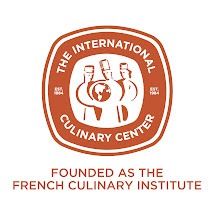
As we sat on a stage in the open air in front of Borough Hall in downtown Brooklyn, about three hundred people gathered (with seats for only 70). David and Dan mesmerized them!
If one could pair two chefs from the Chef’s Story (CS) program, these were two of the most complementary. Dan had worked for David early in his career and was greatly influenced by him. It was flattering for David to hear those stories and it was fun for Dan to rib David on his eclectic style in the kitchen. The crowd felt they were eavesdropping on their conversation.
I sparked their dialogue with a question about their grandmothers. (Each had started their Chef’s Story show talking about their grandmothers.) Both grandmothers had ‘back to the land’ lifestyles albeit in a different way. Bouley’s grandmother was a French immigrant who replicated her country way of life in Rhode Island, not only exposing David to raising (and eating) rabbits at a tender age but also knowing what day boat fish tasted like.
Dan’s grandmother, on the other hand, was more a ‘gentlewoman’ farmer. He painted quite a dashing figure of her….she dated prime ministers and ambassadors. She was a world traveler but grounded herself on a farm in Massachusetts, the eponymous Blue Hill. She raised cattle and vegetables and Dan in his youth spent a lot of time with her. Both men were imbued with childhood tastes that they incessantly strive to emulate in their restaurants.
Dan in his CS program related a fun story about the first night working at Bouley. David had starting yelling across the kitchen that he had to, ‘talk to his fish.’ Dan had no idea what he was talking about. We asked David to explain.
Bouley in his soft but assertive voice explained that every fish, like every person is different. Not only is every fish different, but every cut from a fish is different. It is absolutely essential to be sensitive to the nuances. You have to feel how salt is going to react to that particular piece of fish. This ‘talking’ extends to all foods. You can’t just work as if you are on a conveyor belt. You have to look and respect each individual product.
The conversation at one turn, described how the kitchen at Bouley operated. Dan was quite eloquent about this. He said it was organized chaos. The audience laughed. David bowed his head and blushed. Then Dan went on to explain how this was part of David’s genius. At various times during service David would change a recipe. He would even change the menu. It kept the cooks on their toes, constantly. Dan talked about maintaining a fear in the kitchen, a healthy fear. It compared to an excitement of not knowing but having to be ready. If cooks get complacent, the food tastes bland. If the cook is alert, on edge, it reflects in the food.
Of course we talked about products, sustainability and the importance of respecting the environment. Both Bouley and Barber proselytized these virtues long before they became buzzwords. I asked where sustainability was going. Chefs, they believe, will not only be known for dazzling techniques, or tastes but for how they source their products.
Dan was quite animated speaking about the stories that go with a product. At Stone Barns, he is fortunate to have a true farm to table experience. He told the story of a 5th generation of garlic that a customer brought to him. It was handed down from the man’s Italian great, great, great grandfather. The bulb seeds came from a renowned town in Italy known for growing exceptional garlic. The man asked that Stone Barns take over the patrimony of the garlic. He felt too great a pressure to keep this sport of the bulb regenerating year to year. Stone Barns, of course, accepted the offer. The garlic, though, was only to be used in cloves, not whole. Thus in the restaurant it was served grilled and spread over toast. But it could not just be served. People would so appreciate to know the care with which this particular garlic was preserved. Thus the Blue Hill waitstaff had to learn the background and deliver the story. Customers left the restaurant feeling they had eaten the best garlic of their lives. Had they? It certainly was good, but the best? Did it matter? What mattered is they understood the caring of the growing, the generations of protection of heirloom products and how worthwhile it is to take the time and money and make sure these products are not lost. It is more than organic, it is more than sustainable. It involves an understanding and appreciation. That is the future for American chefs….and diners.
Thank you David! Thank you Dan!
